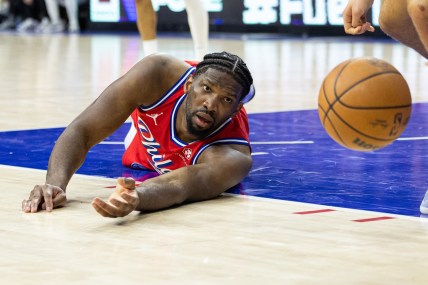The Phoenix Suns had until 3:00 PM EST on Monday to sign star center Deandre Ayton to a contract extension that would have prevented him from hitting the restricted NBA free agent market next summer.
One day earlier, Phoenix had agreed to sign fellow 2018 draft mate Mikal Bridges to a four-year, $90 million extension — potentially setting up some major issues as it related to Ayton.
Now that the deadline has passed, the 23-year-old Ayton was not locked up on a long-term deal. The former No. 1 pick wanted a max-level rookie extension that would have guaranteed him $172.5 million with the possibility of earning $207 million over five seasons. He was not going to accept anything less than that. Meanwhile, embattled Suns owner Robert Sarver was seemingly not willing to meet the center’s asking price.
“If we can get something that works for both sides, we definitely would,” Sarver said earlier in October.
Here’s several reasons why this is a mistake for the Suns.
Related: Updated 2021-22 NBA power rankings
Deandre Ayton contract isn’t about previous production
Let’s just be clear here. Ayton has not performed like a max-contract player. He isn’t in the same stratosphere as fellow 2018 classmates Luka Doncic and Trae Young, both of whom signed for the max this past summer.
Rather, it’s all about the big man’s growing ability on both ends of the court and what we saw from him during Phoenix’ shocking run to the NBA Finals a season ago.
Ayton averaged 15.8 points and 11.8 rebounds on a resounding 66% shooting from the field in 22 playoff games. He came up clutch in big moments and seemed to work well as a No. 3 scoring option behind Chris Paul and Devin Booker.
Related: 2021-22 NBA Playoff and championship predictions
Before anyone concludes that a No. 3 scoring option shouldn’t be a max-contract player, we must look at the landscape of the league. Just check in on the likes of the Brooklyn Nets, Los Angeles Lakers, Golden State Warriors and Milwaukee Bucks. All four of these contenders have three max-contract players, and it’s worked out pretty darn well for them.
Deandre Ayton stats have improved leaps and bounds
- 2018-19: 16.3 points, 10.3 rebounds, 59% shooting
- 2019-20: 18.2 points, 11.5 rebounds, 55% shooting
- 2020-21: 14.4 points, 10.5 rebounds, 63% shooting
It’s relatively easy for someone of Ayton’s skill set to drop 18 points per game on a non-playoff team. In no way does it mean said player was efficient on both ends of the court. This is what defined Ayton throughout the first two seasons of his career.
When looking at the advanced stats, Ayton had a career-best 2020-21 campaign. His offensive win shares jumped from 1.5 as a sophomore to 5.3. The big man also nearly matched his total win shares from his first two seasons while finally coming out of the red when it comes to defensive plus minus. This is no small thing. It tells us a story of a young man who has improved big time on both ends of the court.
Potential drama in the desert

We’re not going to argue the merits of Phoenix signing Bridges to that expensive contract extension. Rather, it’s all about the Suns prioritizing a lesser player over a potential franchise cornerstone. At the very least, that’s the way Deandre Ayton and his camp might see it.
Now slated to hit the restricted free agent market at a time when several teams will have a ton of cap room, Phoenix will probably be forced to match any max-contract offer. So, why let this entire thing play out entering a season in which this squad has championship aspirations?
Related: Top 50 players in the NBA today
The larger question here is whether Ayton will even want to return to the Suns following the 2021-22 campaign. He could request a trade. He could tell them that he won’t report should they match any offer. It’s not something this team needed following one of the best seasons in franchise history and with its owner seen as one of the worst at his position in the Association.
